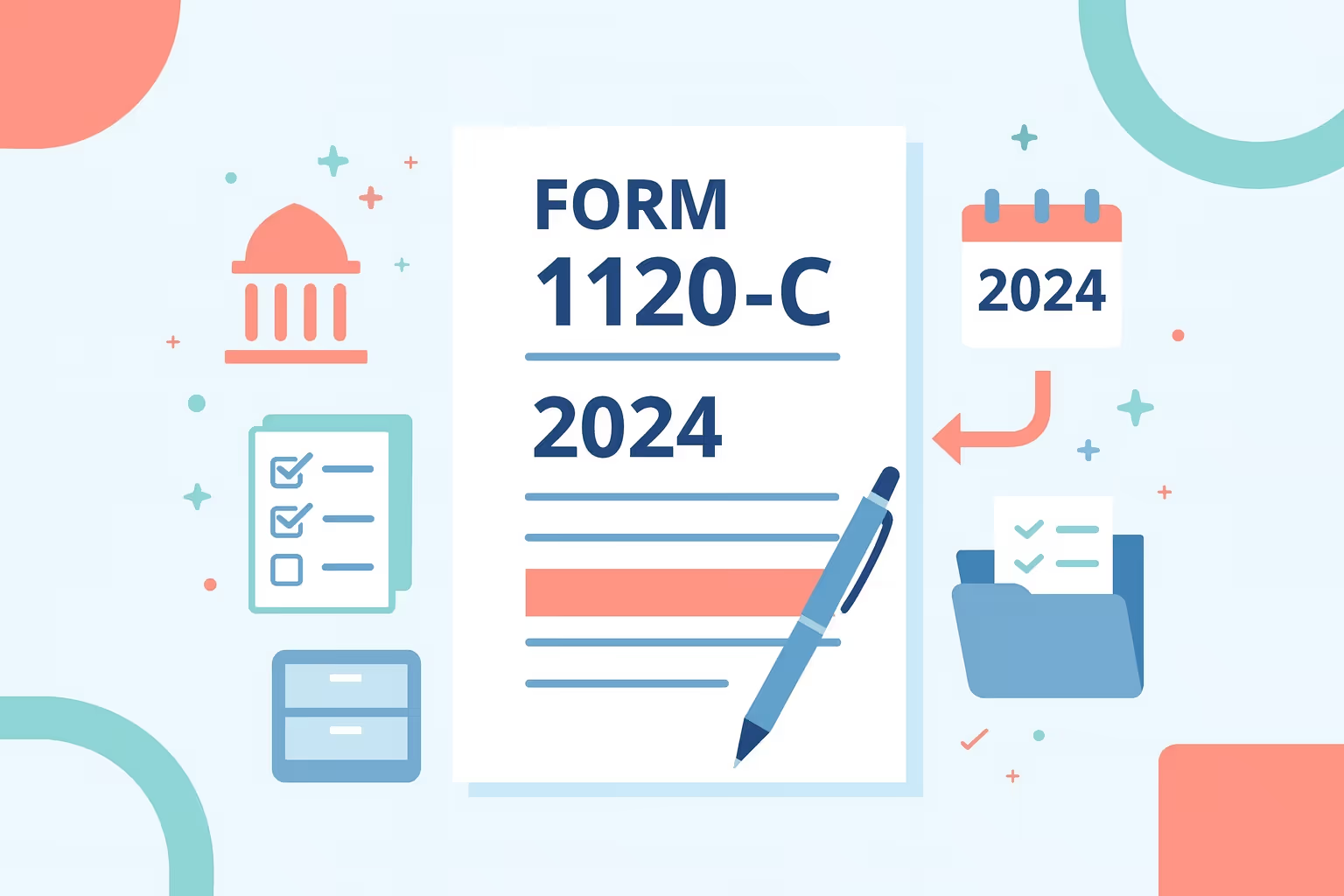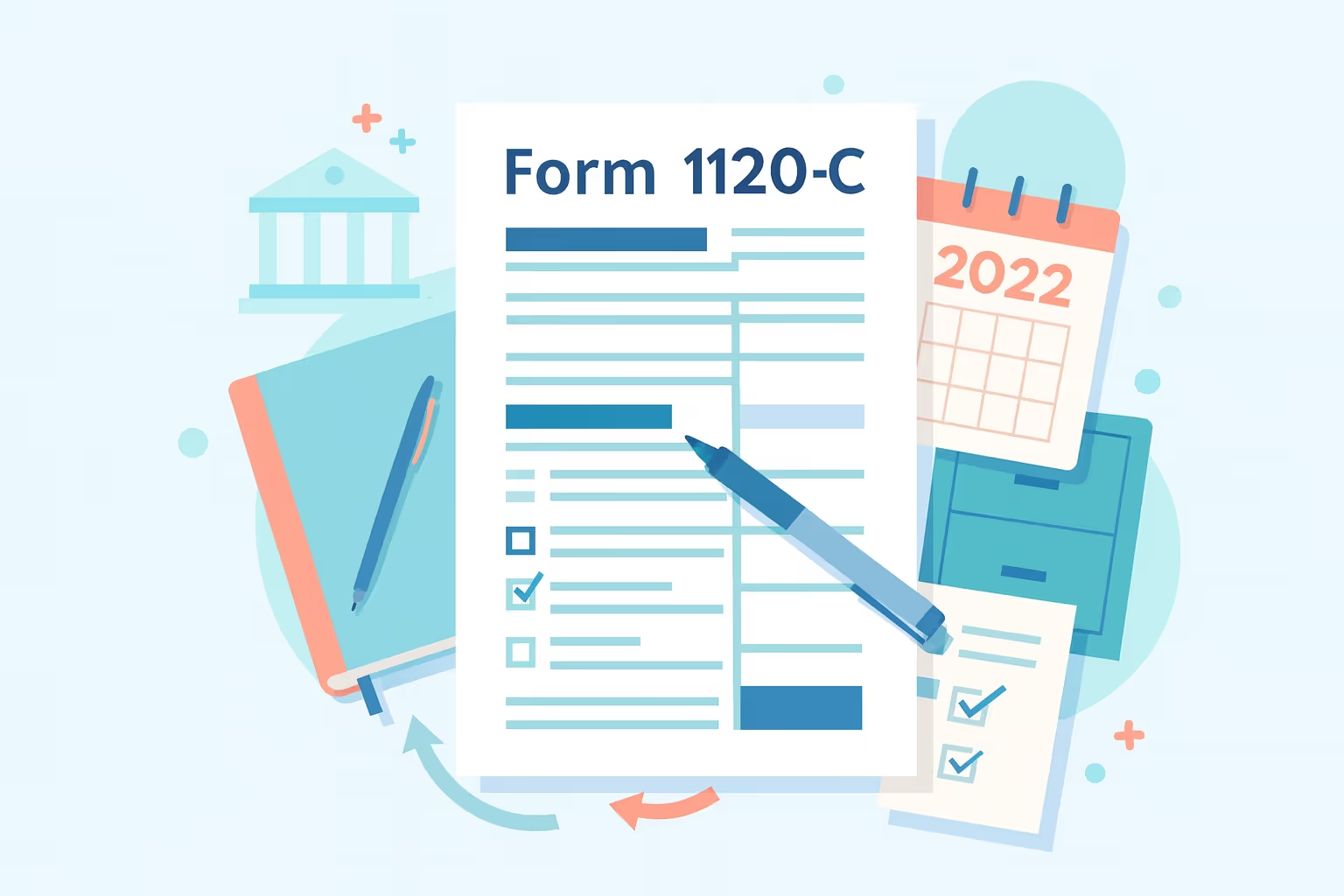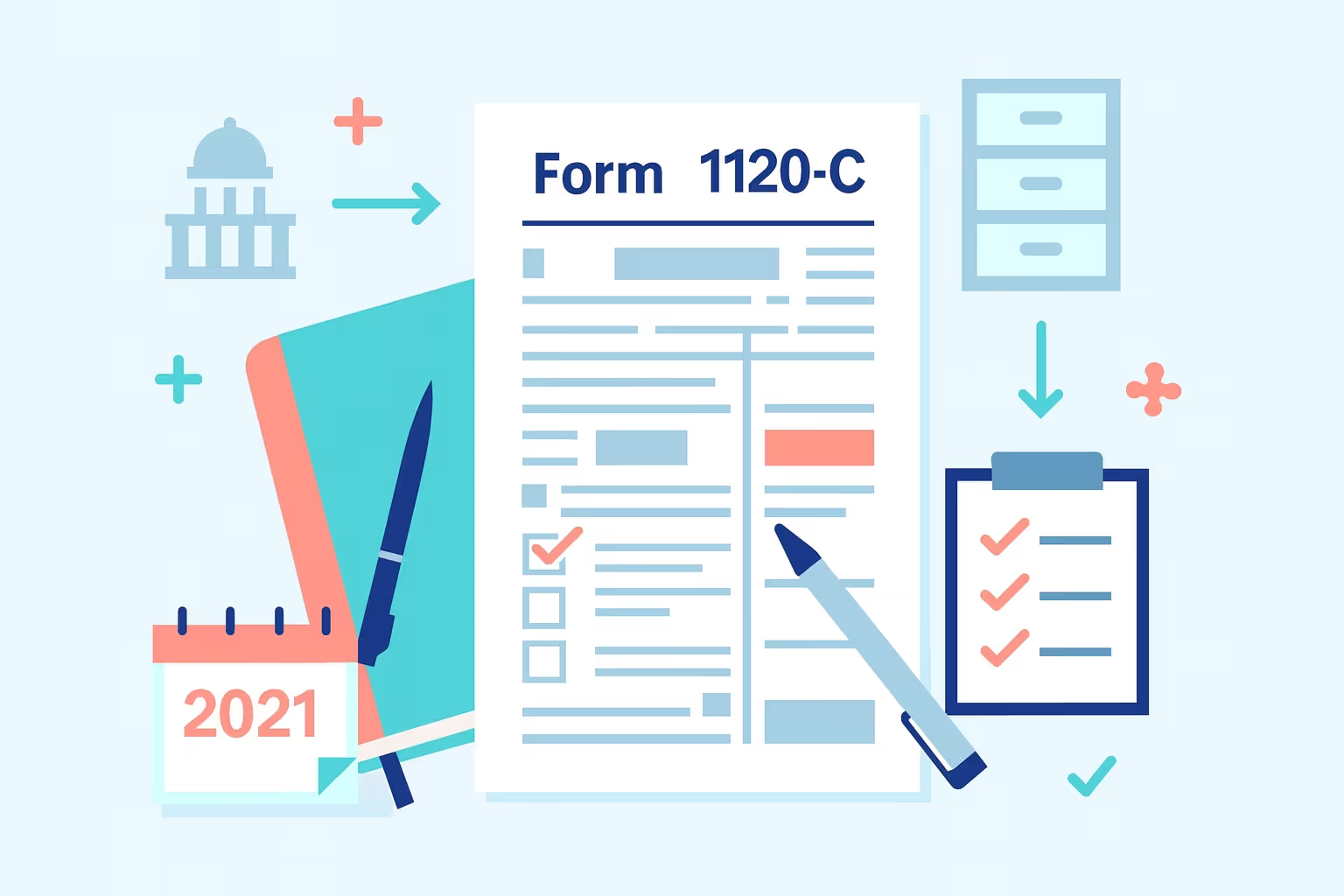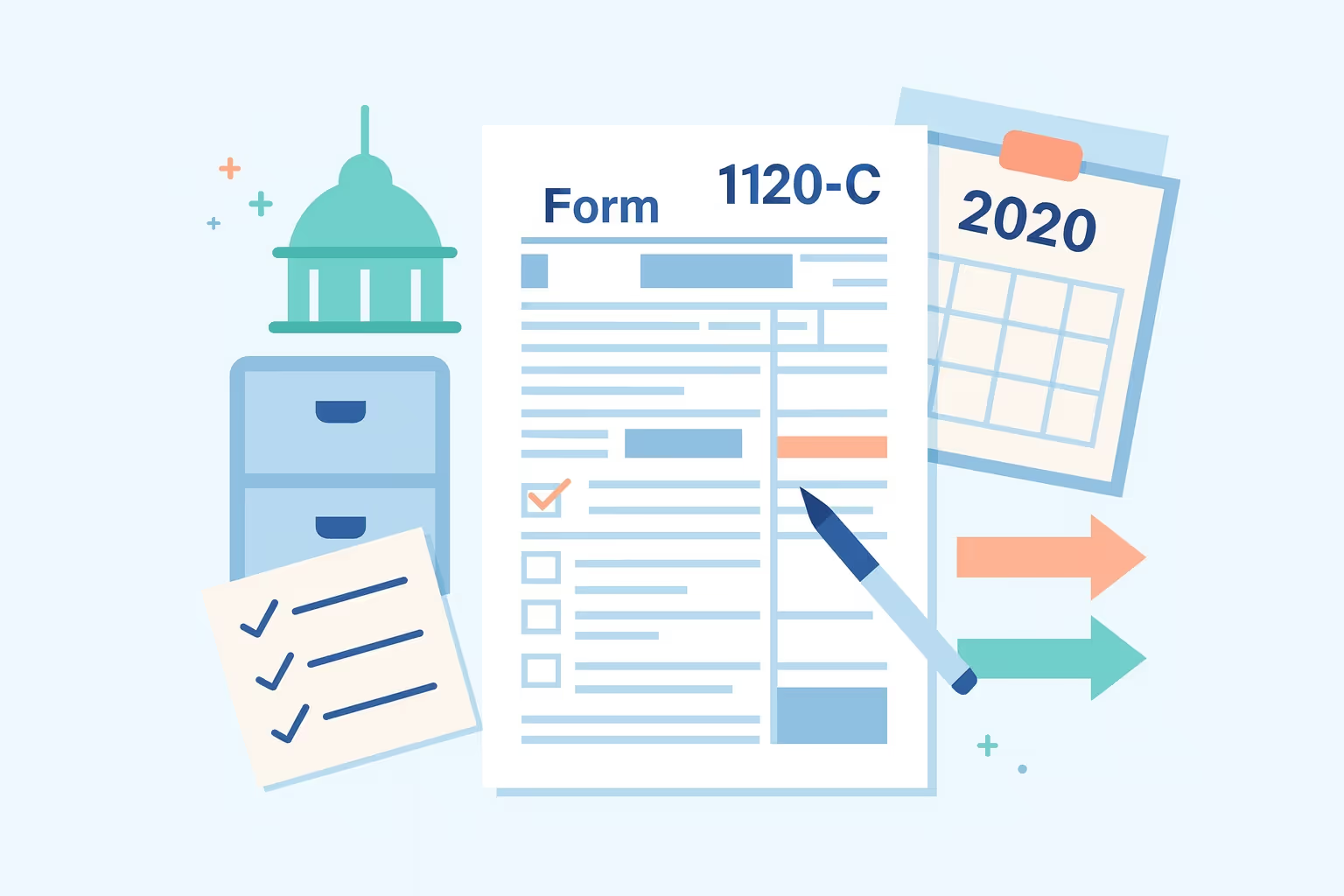
Form 1120-C 2017 instructions provide cooperative associations with the official process for reporting their income, deductions, credits, and tax payments to the IRS. This form applies to cooperative businesses that operate under specific tax laws outlined in section 1381 of the Internal Revenue Code. It helps co-ops and their members accurately document financial activity such as profits, dividends, and distributions to shareholders or patrons.
Filing Form 1120-C requires each cooperative to complete all necessary pages, verify specific criteria, and submit the return by the appropriate due date. Cooperatives must also ensure the accuracy of information such as income, capital, and banking details to avoid delays or penalties. When using online systems for filing or payment, users should verify security by checking for a locked padlock icon and using multifactor authentication. These steps protect personal identification numbers, enrollment details, and other sensitive account information.
The Internal Revenue Service encourages companies and partnerships operating as cooperatives to stay informed about the filing process and payment requirements. If assistance is needed, a qualified tax professional can help interpret federal law, confirm eligibility, and review completed forms before submission to ensure accuracy and completeness. Understanding how to properly complete this return ensures compliance with the Department of the Treasury and supports accurate financial reporting for all members and owners.
Understanding Form 1120-C
Form 1120-C is the official U.S. Income Tax Return for Cooperative Associations. It is used by cooperative businesses and co-ops to report income, deductions, credits, and tax liabilities to the IRS. This form applies to companies operating under section 1381 of the Internal Revenue Code, including farmers’ cooperatives and other organizations that distribute profits or dividends to members in proportion to their participation or investment.
1. Purpose and Function
- Form 1120-C enables a cooperative to report income from sales, services, or investments and calculate the tax owed.
- It serves as the primary financial report to the Department of the Treasury, confirming that the cooperative is in compliance with tax laws.
- The form ensures members, owners, and shareholders receive proper recognition of distributed profits or dividends.
2. Structure and Key Pages
- Page 1: Reports gross income, deductions, and tax computation.
- Schedules C, G, and H: Detail dividends, patronage income, and section 1382 adjustments.
- Schedules J, K, L, M-1, and M-2: Provide information on tax calculation, balance sheets, reconciliations, and retained earnings.
- Each section determines how much of a cooperative’s income is taxable or distributed to patrons.
3. Common Terms and Concepts
- Patronage income represents earnings from transactions with members.
- Nonpatronage income comes from outside business activity.
- Dividends and distributions refer to payments or allocations made to members or investors based on participation.
- Capital reflects each member’s equity or investment in the cooperative system.
Understanding the purpose and structure of Form 1120-C helps cooperatives meet filing requirements and maintain accurate tax and financial records. It also allows management, directors, and partners to evaluate the organization’s overall performance, ensuring compliance with IRS standards and promoting transparency among members and stakeholders.
Who Must File—and Who Does Not?
Form 1120-C must be filed by any cooperative that operates on a cooperative basis under section 1381 of the Internal Revenue Code. This includes organizations that allocate profits, dividends, or other benefits to members or patrons based on the business done with or for them. Cooperatives are generally organized to provide financial or operational benefits to members while maintaining a democratic ownership structure.
1. Entities Required to File
- Farmers’ cooperatives under section 521 that distribute earnings to members based on patronage must file annually, even if no taxable income exists.
- Nonexempt cooperatives that handle member and nonmember transactions must also complete this form.
- Cooperative corporations engaged in marketing, purchasing, or service operations for members are subject to filing.
- Co-ops that have taxable income, business activity, or distributions during the tax year are expected to report to the IRS.
2. Entities Not Required to File
- Organizations are fully exempt from income tax under Chapter 1 of the Internal Revenue Code, except for exempt farmers’ cooperatives under section 521.
- Foreign corporations that do not engage in trade or business in the United States.
- Entities classified under other tax forms, such as partnerships or disregarded entities.
Cooperative associations should review the IRS filing criteria annually, as exceptions and requirements are subject to change. When uncertain, consulting a qualified tax professional helps determine eligibility and ensures the cooperative maintains proper filing status.
What’s New for the 2017 Tax Year?
The 2017 tax year introduced significant changes that affected how cooperatives calculate and report taxes. These updates were part of broader reforms aimed at simplifying corporate taxation and revising specific deduction rules.
1. Corporate Tax Rate Change
- For tax years beginning after December 31, 2017, cooperatives are subject to a flat 21% rate, rather than graduated brackets.
- Fiscal year co-ops beginning before January 1, 2018, and ending after that date must use blended rate calculations under section 15.
2. Alternative Minimum Tax (AMT) Repeal
- The corporate AMT was repealed for years beginning after December 31, 2017.
- Any prior AMT credits may be carried forward as refundable credits in subsequent years.
3. Net Operating Loss (NOL) Adjustments
- The two-year carryback rule was eliminated for losses after 2017.
- The carry-forward period became indefinite, but deductions are limited to 80% of taxable income.
4. Entertainment and Meals Deductions
- Deductions for entertainment, amusement, or recreation expenses were removed.
- Meals remain 50% deductible under certain conditions, but cannot include entertainment activities.
5. Foreign Source Dividends
- Section 245A introduced a participation exemption for dividends received from foreign corporations in which the United States shareholder owns at least 10%.
- Cooperatives with international operations must review this change carefully.
6. Penalties and Relief Provisions
- The minimum late-filing penalty increased to the lesser of the tax due or $210.
- Disaster relief credits and extensions are applied to cooperatives affected by federally declared disasters.
These updates require careful attention when preparing Form 1120-C for 2017, especially for cooperatives operating on a fiscal year basis or with multiple sources of income.
Preparation Checklist—What to Gather First?
Before completing Form 1120-C, every cooperative should collect key business, financial, and identification documents. This preparation ensures that all income, deductions, and tax payments are reported accurately to the IRS.
Information to Collect
- Identification details – Each cooperative must have its Employer Identification Number (EIN), legal business name, and current mailing address ready for accurate reporting.
- Financial records – Cooperatives should gather their balance sheets, income statements, and general ledgers to ensure all financial data is complete and consistent.
- Banking documentation – All bank statements, deposits, loans, and related financial transactions must be available for verification.
- Patronage and nonpatronage records – Detailed information on income distributions, dividends, and member allocations is required to separate taxable and nontaxable income.
- Prior-year return – A copy of the previous Form 1120-C helps verify carry-forward amounts and maintain consistency between tax years.
- Employment and compensation details – Payroll records and officer compensation reports are needed to support salary and benefit deductions.
- Tax payment confirmations – Cooperatives should keep proof of all payments or deposits made through the Electronic Federal Tax Payment System or other IRS-approved methods.
- Supporting documentation – Receipts, invoices, and legal contracts are necessary to substantiate claimed deductions and reported expenses.
System Access and Security
When submitting information electronically, users must confirm secure access by using multifactor authentication and ensuring a locked padlock icon appears in the browser. The IRS may send email notifications regarding receipt or confirmation within several business days. Cooperatives should also maintain current enrollment status in federal payment systems and keep their personal identification number or SSN information private.
Completing this checklist before starting the filing process helps cooperatives streamline data entry, reduce errors, and stay compliant with IRS requirements. Proper organization also allows tax professionals to review records efficiently and identify potential benefits or deductions.
Step-by-Step Filing Instructions
Filing Form 1120-C requires accuracy, organization, and attention to detail. Cooperatives must complete all pages correctly, confirm totals, and include necessary schedules before submitting the form to the IRS.
Step 1: Complete the Header Section.
Enter the cooperative’s legal name, address, and Employer Identification Number. Include the date of incorporation and total assets, and select whether the return is initial, final, or amended. Ensure that all details match those from prior IRS and state filings.
Step 2: Report Income (Lines 1–10).
Report total gross receipts, subtract returns and allowances, and calculate net sales. Compute the cost of goods sold using Form 1125-A. Include other sources of income, such as dividends, rents, capital gains, and interest. Accurate reporting supports proper financial and tax documentation.
Step 3: Record Deductions (Lines 11–24).
List all allowable deductions, including officer compensation, salaries, rent, interest, and depreciation. Use supporting forms, such as Form 1125-E and Form 4562, when required. Retain receipts and records to justify claimed deductions.
Step 4: Calculate Taxable Income and Total Tax (Lines 25–28).
Subtract deductions from total income, then apply special deductions or net operating losses. Use Schedule J to determine total tax and applicable credits. Line 28 shows the final tax due for the year.
Step 5: Report Payments and Credits (Lines 29–33).
Enter all payments made through EFTPS or other approved systems, including estimated and prior-year overpayments. The difference between total payments and tax owed determines whether a balance is due or a refund is owed.
Step 6: Sign and Submit the Form.
An authorized officer, such as a director or treasurer, must sign and date the form. For electronic filings, use a valid personal identification number and follow IRS authentication steps. Mailed forms must include all pages and be postmarked by the due date.
Completing these steps carefully ensures compliance with IRS requirements and accurate financial reporting. Cooperatives are encouraged to consult a tax professional for assistance with complex filings.
Filing Options—E-File, Paper, and Extensions
Cooperatives can file Form 1120-C electronically or by mail, depending on their eligibility and filing preference. The IRS encourages e-filing to ensure faster processing, greater accuracy, and more secure submission of financial data.
E-File Option
- E-filing is available through IRS-approved providers and authorized tax software systems.
- It allows cooperatives to submit returns securely, make tax payments directly from their banking accounts, and receive confirmation of receipt.
- To maintain data protection, users should enable multifactor authentication and verify the presence of the locked padlock icon before entering sensitive account details.
- The IRS system may send email notifications confirming acceptance or indicating issues that need correction within a few business days.
Paper Filing Option
- Cooperatives that cannot e-file may mail completed forms to the appropriate IRS processing center.
- For domestic co-ops, returns should be mailed to the Internal Revenue Service Center in Ogden, Utah.
- Foreign cooperatives should use the Ogden, Utah, P.O. Box address listed in the IRS instructions.
- The mailing should include all schedules and attachments, postmarked by the due date, and preferably sent through a trackable mail service.
Filing Extensions
- Cooperatives that need additional time to prepare their return may file Form 7004 before the original due date.
- Filing Form 7004 extends only the filing deadline, not the tax payment deadline.
- Any tax due must be paid with the extension to avoid interest and late-payment penalties.
Filing through the proper method and observing the required deadlines helps cooperatives remain compliant and avoid unnecessary penalties. Planning ensures that submissions and payments are processed without delay.
Paying Your Tax—EFTPS, Estimates, and Penalties
Most cooperatives are required to make their tax payments electronically through the Electronic Federal Tax Payment System (EFTPS). This federal system provides secure, trackable, and flexible options for submitting funds to the Department of the Treasury.
Enrolling in EFTPS
- Cooperatives must enroll online or by calling an IRS-approved service provider.
- Enrollment requires an Employer Identification Number, banking details, and a valid mailing address.
- After enrolling, the IRS mails a personal identification number used to access the cooperative’s EFTPS account.
Making Payments
- Payments can be scheduled online or by phone, with funds withdrawn directly from the cooperative’s bank account.
- Transactions should be scheduled at least one business day before the payment date to ensure timely posting.
- Same-day wire payments are available for urgent cases but may involve additional banking fees.
Estimated Tax Requirements
- Cooperatives that expect to owe $500 or more in federal tax must make quarterly estimated tax payments.
- Payments are due on the 15th day of the 4th, 6th, 9th, and 12th months of the fiscal year.
- Paying the smaller of 100% of the previous year’s tax or the current year’s estimated amount generally satisfies IRS requirements and avoids penalties.
Penalties for Late Payment
- The IRS applies a 0.5% monthly penalty on unpaid taxes, with a maximum penalty of 25% per year.
- Interest compounds daily on any unpaid tax or penalty balance.
- Filing on time, even without full payment, helps reduce overall penalties and maintain good tax standing.
Following EFTPS guidelines and keeping accurate payment records ensures compliance and minimizes the risk of interest or penalties. If difficulties arise, a cooperative should contact a tax professional or the IRS for assistance.
Required Schedules and Attachments
Form 1120-C requires several schedules and attachments to report different types of income, deductions, and tax credits. Including all applicable schedules helps ensure the IRS accurately assesses the cooperative’s financial and tax position.
Always Required Schedules
- Schedule C: Reports dividend income and special deductions.
- Schedule G: Separates patronage and nonpatronage income and deductions.
- Schedule H: Lists deductions and adjustments under section 1382.
- Schedules J, K, L, M-1, and M-2: Cover tax computation, balance sheets, reconciliation of book and tax income, and retained earnings.
Conditional Attachments
- Form 1125-A: Required when the cooperative reports cost of goods sold.
- Form 1125-E: Used to report officer compensation and ownership details.
- Form 4562: Covers depreciation and amortization deductions.
- Form 4797 or Schedule D: Reports capital gains and losses from asset sales.
Special Situations and Credits
- Form 851: Required when filing a consolidated return with multiple affiliated corporations.
- Schedule M-3: Used by cooperatives with total assets exceeding $10 million.
- Form 5472: Filed by 25%-foreign-owned corporations or those with related-party transactions.
- Forms 1118, 3800, or 8827: Used for foreign tax credits, general business credits, and prior-year minimum tax credits.
Cooperatives should verify all required schedules before submitting Form 1120-C. Completing every applicable attachment accurately reduces IRS processing delays and ensures compliance with federal tax laws.
Common Mistakes to Avoid
Cooperatives filing Form 1120-C must ensure that each section is completed accurately and all schedules are attached. Errors in reporting or late filing can lead to penalties, delays, and IRS notices.
Filing and Deadline Errors
- Failing to meet the filing due date or submitting Form 7004 after the deadline can result in penalties and interest charges.
- Some cooperatives assume all filings are due on the same date, but fiscal year co-ops may have different deadlines under section 6072(d).
- Failing to pay the tax due when filing an extension can result in additional penalties, even if the filing itself is on time.
Form Completion Issues
- Incorrectly identifying the cooperative type or leaving unchecked boxes in the header section often causes return rejections.
- Inaccurate Employer Identification Numbers or incomplete contact details can delay IRS processing.
- Using outdated forms from a previous tax year can cause discrepancies in tax calculations.
Financial and Reporting Mistakes
- Misclassifying patronage and nonpatronage income can result in underpayment or misreported earnings.
- Neglecting to attach required forms, such as Form 1125-E or Form 4562, often triggers IRS follow-up requests.
- Forgetting to sign or date the return renders the submission invalid.
Avoiding these mistakes helps cooperatives maintain accurate records and meet all federal reporting requirements. A careful review by a tax professional or another authorized person can help prevent errors before submission.
Exceptional Cases—Inactive/Zero-Activity or Final Return
Even if a cooperative has little or no financial activity during the tax year, it may still be required to file Form 1120-C. Filing ensures the cooperative maintains an active status with the IRS and complies with federal tax law.
Filing Requirements for Inactive Cooperatives
- Cooperatives must generally file even when no income or operations occurred during the tax year.
- A return must include identifying information, total assets, and any minimal financial activity, such as bank fees or interest.
- Only cooperatives that have fully dissolved under state law and distributed all assets to members may stop filing.
Completing a Zero-Activity Return
- All income lines should show zero if no business was conducted.
- Deductible expenses, such as professional fees, storage costs, or minimal taxes, should still be reported.
- Schedules must be completed, even if they show no activity, to confirm compliance.
Filing a Final Return
- A cooperative closing must be permanently marked as “Final return” and include the date of dissolution.
- The final filing must report all asset distributions and confirm closure with the state department of revenue.
- It is recommended to retain documentation of the dissolution process and any final tax payments for future reference and recordkeeping purposes.
Filing a return even during inactive periods helps prevent penalties and preserves the cooperative’s compliance history. Consulting a tax professional ensures the correct classification for inactive or dissolved entities.
First-Time Filer Guidance and Timeline
Filing Form 1120-C for the first time can be complex for cooperatives unfamiliar with IRS procedures. Proper planning and adherence to each step simplify the process and prevent errors in the filing process.
Verify Cooperative Status
- Confirm that the organization meets the definition of a cooperative under section 1381 of the Internal Revenue Code.
- Review articles of incorporation and bylaws to ensure the cooperative operates in the best interest of its members.
Prepare Early
- Begin gathering financial records and identification details several weeks before the due date.
- Create a checklist of forms, schedules, and supporting documents required for the filing year.
- Register for EFTPS if not already enrolled, as payment access may take several business days to activate.
Filing Timeline Example
- Month 1: Gather records, confirm member allocations, and review prior filings.
- Month 2: Complete the draft Form 1120-C and review with management or a tax professional.
- Month 3: Submit the form electronically or by mail before the due date and schedule tax payments.
A well-structured filing process ensures compliance with IRS rules and avoids last-minute issues. Cooperatives are encouraged to maintain consistent recordkeeping and seek professional assistance when needed.
Frequently Asked Questions
What is Form 1120-C 2017?
Form 1120-C 2017 instructions guide cooperative associations in reporting income, deductions, and profits to the IRS. They explain how co-ops and other companies must complete the form, pay their tax liability, and distribute dividends to members or shareholders. The process ensures each cooperative accurately reports financial activity, including interest, capital, and investments, while complying with Treasury and Department of the Treasury requirements.
What is the due date for filing and making a tax payment?
The due date for filing Form 1120-C and making a tax payment depends on the cooperative’s tax year. Most cooperatives must file by the 15th day of the fourth month after the close of their tax year. Payments should be made electronically through IRS-approved systems, such as EFTPS. Filing or paying late may result in penalties and interest charges from the Department of the Treasury.
How can a cooperative safely submit its form and make online payments?
When filing electronically, a cooperative should use a secure IRS-approved system. It must confirm that a locked padlock icon appears in the browser and that multifactor authentication is used for access. The authorized person must sign the submission with a valid personal identification number. Email notifications are generally sent within a few business days to confirm receipt or identify submission issues.
Why should a cooperative consider hiring a tax professional?
A tax professional can assist a cooperative in preparing financial reports, reviewing income distributions, and confirming that all forms meet IRS standards. They provide guidance on deductions, due dates, and required attachments, helping companies and members avoid costly mistakes. This assistance is especially valuable for co-ops with complex investments, loans, or employment arrangements that affect profits and distributions.
What should a cooperative do if it does not meet specific criteria for filing?
If a cooperative does not meet the specific criteria for filing Form 1120-C, it should review the IRS instructions or contact an approved provider for guidance. In some cases, the organization may be subject to different filing requirements, such as those for partnerships or exempt entities. Cooperatives are encouraged to visit the IRS website or seek professional assistance to confirm their filing status before the due date.
























